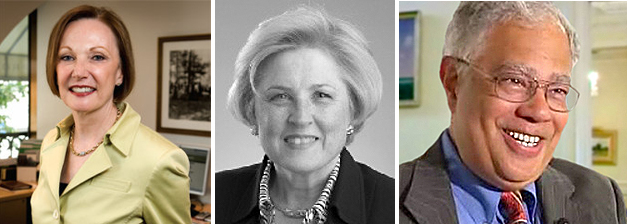
From left: Halstead Property President Diane Ramirez, Eileen Spinola of REBNY and Secretary of State Cesar Perales
The little-known 15-member New York State Board of Real
Estate that helps craft regulations for the industry and hears
public complaints about brokerage licensing has a mandate to
meet at least three times per year yet has not held a meeting in
more than 24 months.
The quasi-governmental body, which includes appointed
members such as Diane Ramirez, president of
Halstead Property, and Eileen Spinola, a senior vice president
for the Real Estate Board of New York, last met in June
2009, before either Ramirez or Spinola began their two-year
terms. Other members include real estate brokers from the
Bronx, Brooklyn, Manhattan and upstate as well as corporate
representatives. The governor, and majority and minority
leaders in the State Senate and Assembly appoint the members.
There are currently two vacant positions.
The low-profile board, which is affiliated with the state
Department of State’s Division of Licensing Services, is an
influential body that has broad authority to develop and
publish rules and regulations affecting real estate brokers
and salespersons. It also provides a forum for the public to
air its grievances about such issues as race or family status
discrimination and provides to the State Legislature an annual
report on real estate licensing complaints.
Brokers and agents were split over whether it mattered if the
state’s board, which is not affiliated with the non-profit trade
and lobbying association the Real Estate Board of New York,
met or not.
“Any board, if they don’t meet has either abdicated their
responsibilities to those they are supposed to oversee… or we
don’t need them and [the board] should be eliminated,” said
one broker from Brooklyn, who is not a board member and
asked to remain anonymous.
Several New York City licensed real estate brokers and
salespersons contacted by The Real Deal did not know the
board existed, or were only vaguely aware of it.
Timour Shafran, an associate broker with commercial
sales firm Capin & Associates, said he was not aware of the
board, but believed the state was doing a comprehensive job
overseeing the highly-regulated industry.
He added that if someone has a complaint against a broker or
in general, the person can file it with the state, whether the
board meets or not.
Adelaide Polsinelli, an associate vice president of investments
at Marcus & Millichap and also not a board member, said
the state agency appeared to be busy developing new
regulations. “I don’t believe they are not getting anything
done,” she said.
The state Secretary of State, now Cesar Perales (appointed by
Governor Andrew Cuomo on March 31, 2011), is by statute
the chair and is responsible for calling meetings for the
government-sponsored body. The Department of State blamed
the long span between gatherings on budgetary constraints,
agency spokesperson Lisa MacSpadden said, and added that
the group is expected to meet in the coming months.
The board oversees critical aspects of the real estate industry
such as rewriting advertising and education requirements for
brokers and salespersons.
Although the board has not met, the six-person advertising
subcommittee, which includes Ramirez and Spinola, has met
four times, most recently in January.
At that meeting, the subcommittee forwarded a wide-ranging
draft overhaul of advertising regulations to REBNY and the New York
State Association of Realtors, the Albany-based chapter of
the National Association of Realtors. Some of the proposed
changes concern email marketing and team advertising. (Once
the board approves the changes, it goes to Cuomo’s office, then
through a public commenting period, before the rules can take
effect. There is no action by the State Legislature.)
The board is constantly reviewing the licensing laws, first
adopted in 1922, one board member, who asked to remain
anonymous, told The Real Deal. The member pointed to the
advertising overhaul as evidence that the board was doing its
job.
“Now [we] are doing the right thing by taking the time and
reviewing different parts of [the law],” the board member said.
The body also hears controversial issues, for example in
the last meeting held, in June 2009, the board heard from
the non-profit advocacy group Fair Housing Justice Center
about alleged racial discrimination in rental apartments in
Brooklyn.
All the board members either declined to comment or did not
respond to requests for comment.
The board provides an annual report to the state Assembly
and Senate judiciary committees with an accounting of the
number of complaints against brokers and agents and their
dispositions.
The number of complaints for New York is falling, state records
show. In 2008, there were 1,223 complaints. In 2009, there
were 1,175 and in 2010, there were 1,021.
The anonymous broker noted that if there was more publicity
including public meetings, the public might realize they can file
complaints, which could increase the number filed.
Although the board members are not paid, their expenses are
covered. That, combined with other costs such as providing
webcasting, bring the total price for a meeting to about $2,600
each, MacSpadden said.